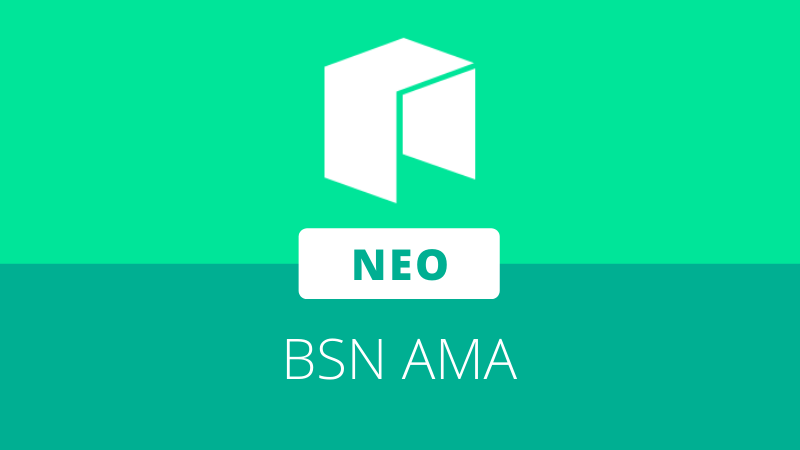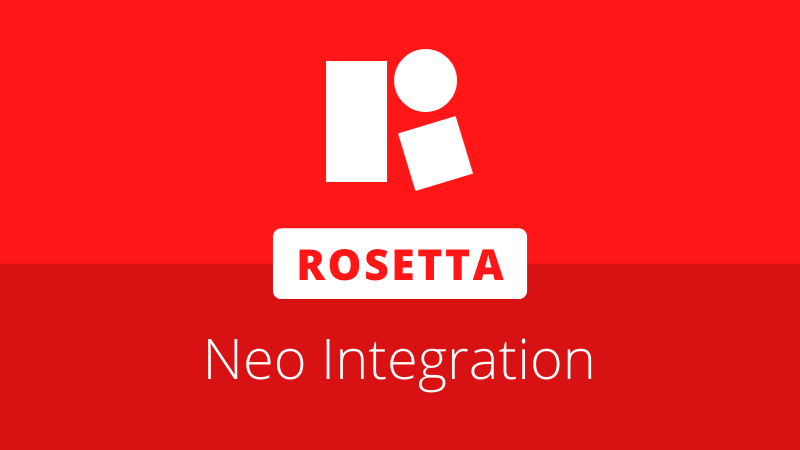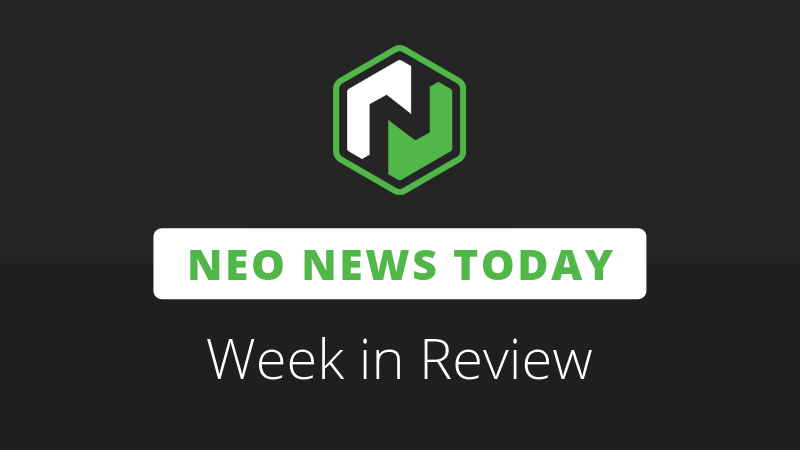
Neo Global Development (NGD) and Blockchain-based Service Network (BSN) recently held an ask me anything (AMA) on the r/Neo subreddit. Participants in the AMA included NGD Ecosystem Growth director, John Wang, and CEO of Red Date Technology and managing director of BSN development association, He Yifan.
The BSN is a “cross-cloud, cross-portal, cross-framework global public infrastructure network used to deploy and operate all types of blockchain applications. [It is] formed by the connection of all cloud resources and data centers using a set of blockchain operating environment protocols.” Compared to its market competitors, BSN claims to reduce operating costs for blockchain applications by up to 80%, equating to approximately US $150 – $300 a year.
Earlier in the week, the Neo blockchain became accessible via the BSN following its August 2020 Global Portal launch, which followed the announcement of a partnership between the two entities in July 2020.
Currently, Neo is available via three BSN Public City Nodes (PCN) located in Hong Kong, Paris, and California. These nodes are maintained by cloud service providers that offer resources such as CPU, storage, and bandwidth.
A primary goal of the BSN is to lower the barriers to entry for blockchain and dApp developers by minimizing the need to learn specific blockchain-related programming languages. Another goal of the BSN is to boost the integration and adoption of blockchain in enterprise, small business, and local government.
To focus its development and foster national support, the BSN partnered with large-scale Chinese-based entities, including the Chinese State Information Center, China UnionPay, and China Mobile. Alongside Neo, the BSN integrates support for the EOS, Ethereum, Tezos, Nervos, and IRISnet public blockchain networks.
In the AMA, Wang and He discussed Neo integration into BSN public city nodes, how BSN and Neo will further their partnership, use cases, how developers will benefit from NEO / BSN integration, plus more.
The full transcript can be found below:
Q1: Will the BSN help NEO tokenize assets (and trade them against the DCEP) and store data through NeoFS faster than without the BSN?
John Wang (NGD director of ecosystem growth): DCEP is yet to go live, so right now, it’s unclear how trading against the DCEP will work. For NeoFS, there definitely can be a good synergy there, because BSN offers server storage – exactly what NeoFS looks for in the early stage.
Q2: How exclusive is the partnership between Neo and BSN, and what will it entail?
John: BSN has several permissionless blockchains in the founding group. The partnership entails offering global blockchain developers the following features: enhanced accessibility, optimized cost-efficiency, and rapid deployment.
I talk about cost-efficiency in answers to other questions. Still, with regards to enhanced accessibility and rapid deployment, it means this: because BSN integrates Neo nodes, both for MainNet and TestNet, together with SDKs and middleware interfaces, BSN becomes a one-stop solution for blockchain developers.
Q3: Will BSN differentiate between Neo as one of the leading Chinese projects and other non-Chinese projects?
John: BSN has based its choice on the achievements of the blockchains in the industry, using a mix of leading Chinese and global blockchains.
Q4: What uses cases will BSN and Neo try to target?
John: Neo with BSN will target the common use cases of the blockchain (realizing the smart economy of the future). The partnership is really about delivering convenience to developers and users across the world.
Q5: What is Neo’s main goal to achieve in the mid-term timeframe?
John: Neo’s goal is to have more users and developers and gather feedback about the BSN infrastructure’s advantages. Right now, entry barriers are quite high: some blockchains require very high TPS and a lot of storage, sometimes terabytes of storage. BSN offers such infrastructure for as low as US $20 per month. We see how this will help us achieve our mid-term goal.
Q6: Will Neo be making any specific changes or updates in the Neo ecosystem to support the BSN platform and any marketing or promotion to advertise the benefits of using Neo to the BSN users?
John: Neo and BSN have marketing and promotion activities planned to targeted developer teams in Asia, Europe, and North America. In some sense, BSN is an onboarding tool for users and developers of Neo blockchain.
Q7: What aspect of this partnership and your overall work with Neo/BSN are you most proud of? Are there any particular milestones or goals that you are hoping to achieve?
John: BSN has some very strong founding partners, including Chinese State Information Center (think tank focusing on policy-making, affiliated with the highest level of the regulators), China UnionPay (bank card payment processor, with expertise in processing massive amounts of transactions every day) and China Mobile (one of the largest mobile carriers, with infrastructure processing large amounts of traffic in China and in other countries).
We are certainly proud of striking this partnership with BSN Global and being in the first batch of participants, which indicates the role Neo plays in the Chinese and global blockchain ecosystem.
He Yifan (CEO of Red Date Technology and managing director of BSN development association): I had a dinner with Mr. Da and John a while ago. I was surprised to find out that Neo has put a lot of efforts to develop interoperability and decentralized storage (like IFPS) technologies. We agreed to work together on these developments. This is the best aspect we work together: to communicate and to collaborate to advance the blockchain and DLT technologies.
Q8: What has materially changed in the Neo ecosystem since 2018, what are the most important reasons that retail investors should look at NEO?
John: There are plenty. BSN, InterWork Alliance (IWA), NeoFS, Neo DeFi (Flamingo) are all good reasons to follow Neo closely.
Q9: How does Neo plan to gain developer interest and attract the millions of .NET developers that could theoretically build on Neo via C#?
John: John deVadoss, the head of NGD Seattle, believes that Neo’s support for various languages (i.e., C#, Python, Go, TypeScript) allows it to “piggyback” off developers that already use this infrastructure.
NGD Seattle has worked on the Neo Developer Toolkit for VS Code, which offers rich support of .NET.
Q10: What kind of dApps and projects – that we don’t have around at the moment – would you love to welcome to the Neo ecosystem? And, what makes you excited about any potential projects?
John: First, we will concentrate on resources and focus on NGD by incubating high-quality and potential projects. Second, we are looking for DeFi, projects associated with traditional businesses, or have a large number of users. And, third, we are looking for new developers to develop small projects in the Neo ecosystem.
Also, check out Flamingo:
https://flamingo.finance
“With the aim of becoming a full-stack DeFi protocol, Flamingo aims to deliver a comprehensive array of modules and tools to support a variety of use cases, from asset cross-chain and on-chain liquidity provision to deposit assets and reward distribution. Moving forward, FLM is set to become a key Neo-based asset which will comprise fees, collateral and governance functions.”
More DeFi projects are coming later.
Q11: How will BSN create a community of developers in collaboration with Neo? Will BSN offer tutorials, meetups, and more? I’m curious about the social community-building aspect of the project.
John: BSN doesn’t have any meetups in the plans, but the documentation is ready and uploaded to the website, and will be updated in the future. We at Neo continue our community building as usual, with meetups, conferences, online and offline courses, and more.
He: BSN will offer tutorials and webinars with Neo every month. BSN is not actively building its own developer community. We want to help all partners including Neo to leverage BSN’s stable and low-cost services to serve their own users and developers. BSN can port its services to third-party websites.
Q12: Neo has a vision and is building the Smart Economy. What is your, or BSN’s, view of the Smart Economy? What needs to be accomplished to enable further innovation and eventually gain some serious mainstream adoption?
John: Setting up the development environment can be quite expensive. BSN will help the industry to gain some serious mainstream adoption in the following way: by reducing costs of development, deployment, operation, maintenance, connectivity, and supervision. The Smart Economy is an economy in which a significant share of economic transactions is done in a trustless, decentralized manner.
He: In this information era, everything will become smarter. We believe in a Smart Economy as Neo does.
For any information technology, such as Internet and blockchain, there are two most important factors: cost and interoperability. The cost to use such technology should be as close to zero as possible. All data accessed by the technology should be as widely interoperable as possible, just like what happened with Internet. That is when we would see a lot of innovations with blockchain and DLT technologies. The public chain is only one type of application. We will see many in the next 20 years. Most of them are beyond our imagination today. Could you imagine what the Internet looks like today from the early 90s?
Q13: The BSN went live on August 10th, 2020, intending to reduce the barrier of entry to the blockchain and improve the developer experience. We are almost three weeks in, and I’m wondering if you could provide an update with early uptake details. Are you already seeing enterprise interest? What has been the best story so far, and do you have some indication of what is to come?
He: BSN China went live on April 25th, we have seen over 1,000 private chains built on BSN. There are many enterprise interests, including some from banks and financial institutions. We want to build BSN into the Internet of blockchains. Everybody can create or access a chain (public or private) cheaply and easily. All smart contracts can call any other smart contracts on any chain with several lines of code, just like websites call other websites/apps through HTTP protocol. We consider today’s public chains as intranets in the early 90s.
Q14: Will it be possible to have Neo development become part of certain Chinese universities’ curriculums by offering these BSN services for free to universities?
He: We are working with Neo to port a permissioned version of the Neo public chain into China and be operational in the next couple of months. BSN is already offering “student accounts” to universities in China. These student accounts can build a three-peer Fabric chain with ten TPS and 10 GB storage per peer for free, per semester. We can integrate a Neo permissioned chain into this plan.
John: Neo is a popular tech for use by students in universities across the world because it’s the leading delegated Byzantine Fault Tolerance (dBFT) platform.
Q15: Knowing that there are rising tensions between the US and China, is the BSN worried about potentially being banned from the US? What are some ways that the BSN will navigate this tension?
He: We consider BSN a global collaboration project, not really a Chinese-only project. We are setting up a technical foundation with five to six major international blockchain technology companies. We will open-source everything within this year to all these partners and we will develop BSN together from this point further. We plan to open source to public in two or three years, so everybody can build a PCN, or a BSN portal, or chain integration. We believe in transparency and open-source. We do not worry about political tension between countries as long as we focus on our vision and hold on to the core value of BSN.
Q16: How does BSN’s three global public nodes support the decentralization vision?
He: BSN is a tool or a network environment which integrates cloud resources and all other resources and technologies to make access to blockchain technologies earlier and cheaper. The PCN’s are not blockchain nodes. You can consider them doors to access these decentralized chains and apps.
Q17: BSN is running Public City Nodes, are you guys planning to run a consensus node on Neo, as well?
He: PCNs are the data centers of BSN we have deployed on many regions/zones of major cloud service providers. We install all blockchain nodes inside PCNs. So PCNs are not blockchain nodes themselves. We are looking into the possibility to run consensus nodes on PCNs.
Q18: What are your views on the practicality and value of individual blockchain tokens?
He: I think the most important aspect for a token is to link its value to real-world assets legally.
Q19: What is in your view the biggest challenge for BSN to gain adoption amongst developers? How are you planning to overcome this?
He: BSN is an infrastructure. We provide APIs to websites, so they can build their own blockchain-as-a-service (BaaS) easily and cheaply. Right now, the websites and online communities are the direct users of BSN. They will provide BSN-enabled services to end users and developers. BSN does not have personal information stored since these websites do not pass such info to BSN. Neo will have BSN-enabled services on its websites soon.
Note: Some edits have been made for formatting and readability.
The full AMA can be found at the following link:
https://www.reddit.com/r/NEO/comments/ihg355/ama_with_bsn_ngd/







About The Author: Dylan Grabowski
Dylan is a reformed urban planner with a passion for covering the Neo ecosystem. His objective as a writer for Neo News Today is to report news in an objective, fact-based, non-sensational manner. When not behind a computer screen, he can be found in the mountains rock climbing. Find Dylan on Twitter (@GrabowskiDylan).
More posts by Dylan Grabowski